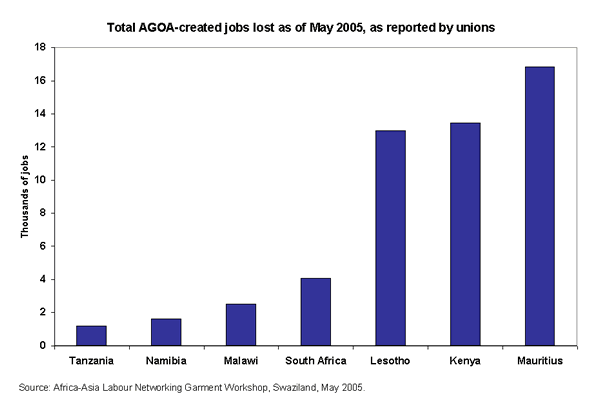See Snapshots archive.
Snapshot for January 9, 2008.
Coming up short on jobs in Africa
by Tony Avirgan
The Clinton administration claimed the Africa Growth and Opportunity Act (AGOA), which Congress passed in 2000, would provide jobs and lift the economies of sub-Saharan African countries. AGOA provides unrestricted, duty-free access to the U.S. market for textiles and garments manufactured or processed in the poorest African countries.
While AGOA has led to some increased foreign investment and additional jobs in Africa, these jobs are in the apparel sector, which tend to be low-wage and unstable when compared with other jobs in manufacturing that require higher capital investment in machinery and infrastructure.
According to a report by the Dutch group, Center for Research on Multinational Corporations (SOMO), the passage of AGOA resulted in competition among African countries to attract foreign investment in apparel. These inducements included eliminating taxes, providing factory shells, and often turning a blind eye to labor abuses. Multinational corporations were required to invest little or nothing in local economies and often pulled out of a country, leaving behind debts and workers when incentives became more attractive in a neighboring country.
These job losses are significant in small African economies. For instance, Lesotho lost 13,000 of the 26,000 jobs created by AGOA. Kenya lost 13,500 of the 30,000 jobs created (see Chart).
Congress is now considering a new preference program for Africa, the New Partnership for Development Act (NPDA). In doing so, it should take into account the negative consequences of AGOA and require private capital investment—where manufacturers invest their own money—and strong labor protections.
The record of AGOA and the development of the NPDA were examined at a forum at EPI on Thursday, January 10. For details of this event, please visit http://www.gpn.org/research/agoa/
